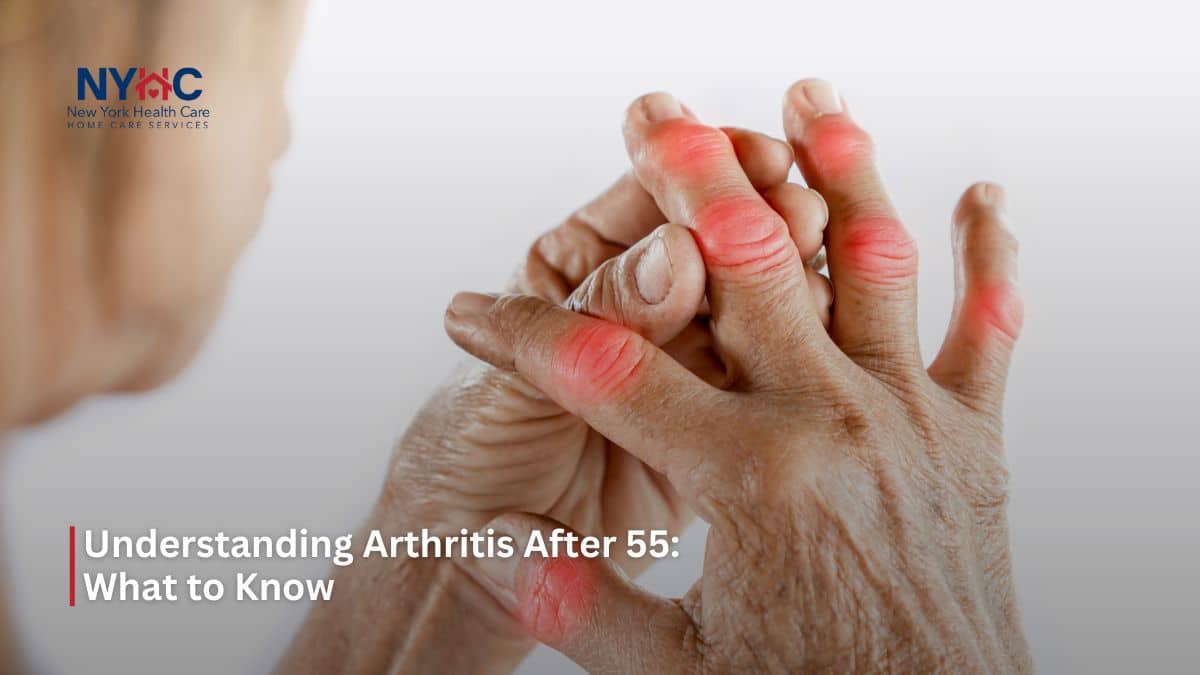Arthritis is not a single condition. It’s a group of over 100 joint-related disorders. As we age, the risk increases, but so does our ability to manage it through proactive healthcare.
The Most Common Types in Older Adults:
- Osteoarthritis (OA): A gradual breakdown of joint cartilage due to years of wear and tear, often affecting the knees, hips, hands, and spine.
- Rheumatoid Arthritis (RA): An autoimmune condition that causes the immune system to attack healthy joint tissue, leading to pain and swelling.
Typical Symptoms Include:
- Persistent joint pain or tenderness
- Morning stiffness or reduced range of motion
- Swollen or inflamed joints
- Fatigue and general discomfort
Taking care of it matters because if left untreated, arthritis can affect your independence and overall well-being. Early recognition and consistent healthcare management can preserve your mobility and quality of life.
Exercise for Relief: Gentle Movement with Big Benefits
Staying active is one of the best things you can do for arthritis—especially with assistance from a PCA or HHA. Even small movements can reduce stiffness and improve strength.
Safe, Effective Exercises for Older Adults:
- Walking: A low-impact way to stay mobile and support heart health.
- Water Exercise: Swimming or water aerobics eases pressure on joints and builds strength.
- Stretching & Chair Yoga: Boosts flexibility and balance without overstraining the body.
- Strength Training: Helps protect joints by strengthening surrounding muscles (light resistance bands or weights work well).
Our tip is to start slow and listen to your body.
Eat Well to Feel Better: Nutrition That Supports Joint Health
Your diet can either reduce inflammation or worsen it. A balanced, anti-inflammatory diet can help control arthritis symptoms, improve energy levels, and support healthy aging.
Foods That Support Joint Health:
- Fatty fish like salmon or sardines (rich in omega-3s)
- Leafy greens such as spinach and kale
- Whole grains, like brown rice and oats
- Berries, full of antioxidants
- Nuts and seeds, especially walnuts and flaxseed
Limit or Avoid:
- Processed snacks and baked goods
- Sugary drinks and soda
- Fried or fast foods
- Red meats in excess
Also, you need to maintain a healthy weight, as it reduces pressure on the knees, hips, and lower back—all very common arthritis hotspots in those 55+.
Treatment Options: Coordinated Care for Long-Term Relief
Managing arthritis effectively involves collaborating with your healthcare team. Your primary care doctor, rheumatologist, physical therapist, and dietitian can all play a role in your care plan.
Common Medical Treatments Include:
- Medications
- NSAIDs (e.g., ibuprofen): For pain and swelling
- DMARDs: Used for RA to slow disease progression
- Corticosteroids: For short-term flare-up control
- Topical creams: For localized pain relief
- Therapies
- Physical therapy to improve movement and strength
- Occupational therapy to adapt everyday tasks and tools
- Complementary Therapies
- Massage therapy for pain relief and relaxation
- Acupuncture or guided meditation for chronic pain management
- Advanced Options
- Cortisone injections for severe joint inflammation
- Joint replacement (knee, hip) for advanced osteoarthritis
Talk to your doctor about what combination of treatments is best for your age, lifestyle, and health history.
Living Well with Arthritis: Aging with Strength and Support
Arthritis may be part of getting older, but it doesn’t have to control your life. With support from experienced healthcare professionals, the right daily habits, and consistent care, many adults over 55 manage arthritis successfully and continue to enjoy an active, meaningful life.
At New York Health Care, we specialize in personalized home care needs. Whether you need assistance with navigating tasks or medication reminders, our team is here to walk with you every step of the way.
Take the First Step Toward Relief Today
Your journey to support navigating daily activities that are impacted by joint health starts with a conversation.
Contact New York Health Care to speak with one of our intake specialists. Together, we’ll support your comfort, mobility, and independence for years to come.

